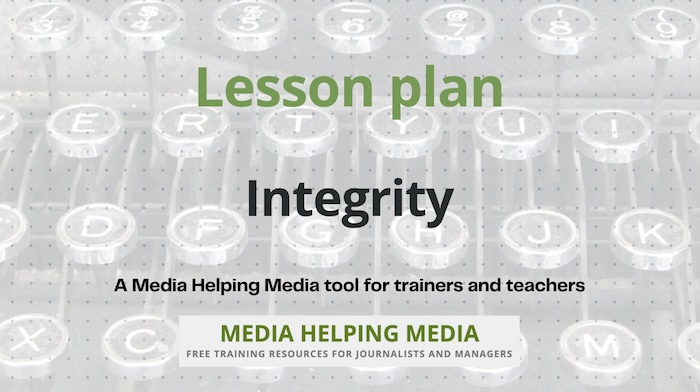
Integrity is essential if a journalist wants to investigate issues thoroughly in order to find the truth.
A journalist with integrity can’t be bought, swayed, or influenced. They do not accept favours, bribes, or promises. They are free from any chains that could prevent them from shining a light in dark places, digging where others don’t, and holding the powerful to account. In editorial terms it means the following:
- not to sell your services for financial reward other than the salary or fee you receive from your employer.
- not to take money from a person, group or organisation in return for ensuring that their story is covered by your news organisation.
- not to promote a story based on any personal, group, or partisan interests.
- not to endorse or appear to endorse any organisation, its products, activities or services.
- not to promote commercial products or services.
- not to promote your own media organisation.
Promotional stories
News releases arrive in the newsroom every day promoting a product or a company, often these are disguised as news items, when, clearly, they are advertising material. We must:
- retain all editorial control of any material that we uncover, or which is given to us by others, and ensure that we have the final say in how it is used or not used.
- when choosing which stories to cover we must do so on the basis of our own independent editorial justification, and we need to be able to defend those decisions if challenged.
- always be aware that some people contributing material will be doing so in order to influence our editorial output
- be able to justify – if we feel we need to name a product, service or organisation in our output – that the decision was required in order to inform the public debate properly and in full.
Product placement
A journalist must never include a product or service in sound, vision or print in return for cash, services or any consideration in kind. We must:
- ensure that references to trade names, brand names and slogans are clearly editorially justified.
- never use material from advertising campaigns or promotions without revealing the source and making clear, through our script, why the material was used.
- not linger on brand names or logos and use verbal references sparingly unless there are strong journalistic reasons for repeated references to a brand.
- never accept free or reduced-cost products or services from those whose brands are featuring in our output.
Free material and gifts
It is extremely dangerous for a journalist to take gifts. There will always be a price to pay at some future date. The best advice is to say no. A journalist should always pay for their own travel and accommodation. There may be some situations where a producer of a lifestyle programme or section is offered facilities to sample so that they can report on them, in such cases the following rules should apply:
- keep accurate records of what has been accepted.
- never guarantee that any product or service will be featured.
- never guarantee the approach that will be taken in dealing with the product or service.
- always inform suppliers that they cannot refer to your news organisation in selling their products.
- give on-air, online or in-print credits only if clearly editorially justified.
- never offer suppliers any editorial say or influence in the programme.
- never offer them a preview of it with a view to them being able to make changes.
Media trips
It is best not to accept expenses-paid trips, unless they are the only way to cover the story – for example, such a case might be the first flight of a new airline service.
Undue prominence
Be careful where a guest on a broadcast programme has a particular product to push, such as a book, a new piece of music, a show or a film. It is fine to discuss the editorial issues, but you need to ensure that they are not taking advantage of you because you are including them in your programme.
Online links
When creating links to articles online, make sure that you link only to material that adds value and is not simply promoting a product. Lazy links go to home pages, thought-through links explain more about the subject. Ensure that links lead to material that explains more about the topic being mentioned so that those using your service will be better informed.
You must never include a link to a commercial site in return for cash, services or any other consideration in kind. All links must be editorially justified and should lead to sites which are:
- clearly relevant to the content of the page where the link is placed
- normally free to access
- normally factually accurate
We must never give the impression that we are endorsing a commercial product or service.
Conflict of interest
There must never be any suggestion that personal, commercial, business, financial or other interests have influenced your news organisation’s editorial decisions. Presenters, reporters, producers, editors, researchers and managers are all affected. The higher someone’s level of editorial responsibility, the greater the need to avoid any possible conflicts of interest. Typical conflicts of interest for journalists include:
- writing for another news organisation
- public speaking/public appearances
- delivering media public relations training
- connections to charities and campaigning organisations
- taking part in political activities
- hospitality and personal benefits
- being an active member of a political party
- being an activist in a campaign organisation
- financial and business interests.
Journalists must declare all these to their senior editorial managers if they feel that there is a conflict of interest that could damage the news organisation’s integrity.
Social action
Journalists should not be seen to campaign about social issues, your job is to report about them, not be part of them. Journalists are free to have their own opinions, but these must not influence your journalistic work. You must remain impartial. This is particularly important where:
- social action programmes or campaigns coincide with a government campaign or lobbying initiative
- The output could be seen to embrace the agenda of a particular campaign group.
Charities
The same is true with charities. Many are competing. As a journalist, you will probably have your favourites. This must never influence your story choice or story treatment. It is healthy to declare charitable interests at the earliest opportunity. Personal interests must never influence story choice or story treatment. A media organisation will work with charities in a number of ways:
- broadcasting/publishing appeals
- mounting fundraising appeals
- reflecting the work of charities in the editorial output
- as partners in social action or awareness campaigns.
However, for every charity doing good there is likely to be another competing in that space. Also, don’t get too close; you may end up covering a story about wrongdoing involving a charity, and you need to be free to examine all issues without fear of being compromised.
External relationships
When entering into an external relationship, journalists must ensure that:
- editorial impartiality and integrity are not compromised and that you control all editorial output.
- the choice of partners is editorially justified and will not bring the media organisation into disrepute.
- no money or other services are accepted in exchange for broadcast coverage or publicity.
- you work with a range of organisations and do not unduly favour one above another
- you do not promote or appear to endorse other organisations, products, services, views or opinions.

Questions
- Why is integrity essential in journalism?
- List three actions that a journalist with integrity should avoid.
- Explain the significance of maintaining editorial control over news material.
- How should journalists handle promotional stories that arrive in the newsroom?
- Describe the guidelines for journalists regarding product placement in their work.
- Why is it important for journalists to avoid accepting gifts or free services?
- Discuss the potential conflicts of interest that journalists must be aware of.
- How should journalists approach social action and charity involvement in their reporting?
- What are the main considerations for journalists when entering into external editorially related relationships?
- What bearing could a journalists personal interests have on story choice and treatment.
Answers
- Integrity ensures that journalists can investigate issues thoroughly and truthfully without being influenced by external pressures.
- Journalists should avoid accepting bribes, promoting stories based on personal interests, and endorsing organisations or products.
- Maintaining editorial control ensures that journalists can decide how to use material independently, defending their choices if challenged.
- Journalists should retain editorial control, justify their story choices independently, and be aware of contributors’ motives.
- Journalists must ensure references to brands are editorially justified and avoid using advertising material without disclosure.
- Accepting gifts can compromise a journalist’s objectivity and lead to future obligations or biases.
- Conflicts of interest include writing for other organisations, political activities, and financial interests, which can affect editorial decisions.
- Journalists should report on social issues impartially and not let personal opinions or charity preferences influence their work.
- Journalists must ensure that external relationships do not compromise editorial integrity and that partnerships are justified.
- Personal interests can bias a journalist’s reporting, so they must remain impartial and transparent about any potential conflicts.
Lesson plan for trainers
If you are a trainer of journalists we have a free lesson plan ‘Integrity in journalism‘ which you are welcome to download and adapt for your own purposes.









